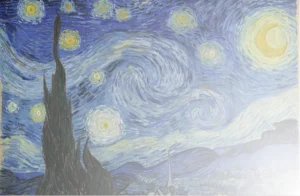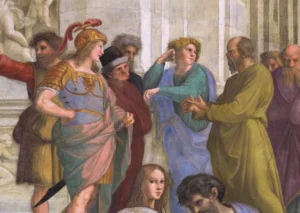Have you ever been on one of those balconies that overlooks a big, academic library? The sheer volume of books covering every shelf and table is astounding—and those are only the ones you can see, not to mention all the various other rooms, archives, and storage contained in just that single library.
There are so many ideas out there. A significant number of them are good ideas that provide insight into truth and transcendent reality. As Catholics in the Western classical tradition, we’re exposed to these—but there seems to be an infinite number of them, too! There’s philosophy: Plato, Aristotle, Cicero, modern contributors like René Girard, even Eastern corollaries like Confucius. There’s theology: Augustine, Athanasius, and Aquinas, Ratzinger and Balthasar. Spirituality: the desert fathers, the Carmelite mystics, the medieval saints, the modern martyrs. Literature: Homer, Virgil, Dante, Shakespeare, Dostoevsky, even Faulkner, Flannery O’Connor, and Steinbeck. Don’t even get me started on art and music. We could go on and on forever—and these categories are only scratching the surface.
Even if we’re able to study and encounter all these ideas, how on earth are we supposed to process them and fully appreciate the truth contained in them? We don’t have an infinite amount of time, so should we just give up trying to wade through because we won’t be able to get through it all anyway?
It’s true that we won’t get to every important and meaningful work there is; that’s effectively impossible. And it’s also true that we probably wouldn’t be able to appreciate the full depth of a single idea or masterpiece even if we spent our whole life studying it. So what’s our path forward?
All these things—philosophy, theology, literature, art—when at their best, share a single purpose: to unite our minds to God. Sometimes, that’s through truth; think of the profound realities exposed by philosophy and theology. Other times, that’s through beauty, like when we’re put in awe but the sheer grandeur or a musical composition or a narrative.
Our job is to allow the truth or goodness of these things to change us in a way that draws us closer to God—and then to take that internal reception and turn it into a gift. These ideas that we encounter can’t stay in the abstract. We have to apply them to our daily lives, to really, practically internalize the realities they communicate. If they don’t have any impact on the way we live and relate to God, we might as well not bother.
But there’s more than just practical impact. Once we’ve received and internalized truth or beauty, we have to turn that the other direction. This is contained in the purpose of a “Great Books” education: not just to read and understand profound works, but to come to a point where you can create works resembling them. Not all of us will be able to write a Divine Comedy or compose a Requiem, but we can’t forget that part of the purpose is to externalize the things we understand towards other people.
That’s a lot of words to introduce a humble student blog. But it’s my hope that the Totus Tuus blog will be able to interact with the Catholic, classical tradition in a way that doesn’t keep it in the abstract, but allows us to see the fundamental truths contained in it and practically apply it to our daily lives—and, through that, to ultimately to come to greater unity with God.






